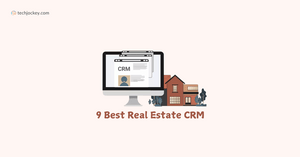As a real estate professional, you are always stuck between multiple tasks. From responding to client enquiries, handling leads, and monitoring property listings to closing deals, these are just a few of the many responsibilities. These duties can become difficult to handle without a system to make the process more efficient.
A Customer Relationship Management (CRM) system can be helpful in this situation. Let's look in this buyer's guide how a real estate CRM system can help you manage customer relationships, enhance sales, and improve productivity.
A Real Estate CRM is software designed to manage, automate, and arrange customer communications, property listings, and transactions. CRMs help real estate professionals improve client experiences, streamline workflows, and boost overall efficiency. By centralising customer data and automating repetitive operations, this software can ease your tasks.
Who uses Real Estate CRM?
Real estate agents, brokers, property managers, and teams use CRM systems. These real estate professionals leverage CRM to manage leads, track client communications, and ensure no detail is overlooked in the pre-and post-sales process.
The Benefits of Real Estate CRM
- Faster response to customer inquiries: Real estate CRM software often comes with auto-responses to customer inquiries. This helps in responding to leads in just a few minutes and increasing the chance of a conversion.
- Generate more leads through targeted campaigns: Through social media, website, and online marketplace integration, residential and commercial real estate CRM ensures higher lead generation and tracking.
- Better customer profiling: You can run targeted marketing campaigns based on customer profiling. CRM for real estate helps segregate customers based on demography, purchase history, and other parameters.
- Faster approval workflows: The software helps real estate agents get quick approvals on contracts. You can set specific guidelines, such as the number and types of documents required to close a deal with a buyer.
- Simplified document generation: Real estate agents can ensure faster documentation for contracts, registration papers, loan papers, and more to close a deal. All important customer-related data can be derived from the CRM software to ensure faster documentation.
- Integration with multiple property listing channels: With the help of realtors' CRM, property owners can list their inventory on multiple online marketplaces and derive more leads.
How Would You Decide If You Need a CRM System?
Many real estate firms struggle with managing a large volume of leads, client follow-ups, and listings. If your company faces issues like disorganized leads, missed opportunities, slow response times, or lack of team collaboration. Then, it's a sign that you could benefit from a real estate CRM system. These pain points often arise when customer data is scattered across spreadsheets, emails, or notes.
This is where a CRM’s lead tracking, task automation, and communication management features can help. A CRM will consolidate client data, automate follow-up tasks, and ensure that no lead is forgotten—all in a single place. It can streamline your sales process and improve conversion rates.
Key Questions to Consider Before Buying a Real Estate CRM System
- Does your team currently have a centralized system for tracking leads and client communications?
- Are you working manually or do you have automated processes?
- How often do you manually have to touch base with your clients?
- How are you managing client follow-ups and ensuring timely responses?
- How do you manage property listings and sync client databases together?
- Can you create reports and insights for your team for actionable insights?
- Is the process you are following easy to use?
Which CRM Is the Best for Real Estate?
Finding the best real estate CRM for your business depends on your primary sales and marketing objectives. Here’s a comparison of top CRM systems in real estate:
| Real Estate CRM Comparison |
| Feature | Buildesk | Sell.do | Build Formula | Follow Up Boss | BoomTown | kvCORE |
| Best For | Large teams | Small to Medium teams | Medium to Large teams | Small to Medium teams | Medium to Large teams | Medium to Large teams |
| Key Strengths | Great for builders and developers; integrated construction management | AI-driven insights; strong marketing automation | Focus on lead generation & marketing automation | Easy-to-use lead management and follow-up tools | Strong lead generation & AI-driven insights | Scalable, customizable CRM with lead capture |
| Weaknesses | Limited appeal for individual agents | Lack of integration with some tools | Less suited for agents beyond property sales | Lacks project management tools | Complex and higher-priced | Steep learning curve, expensive |
| Pricing Plans | ₹ 12,000/mo (excl. GST) | ₹ 1799/mo (excl. GST) | Price On Request | Starting from $69 /mo | Price On Request | Price On Request |
| Reviews | Buildesk Reviews | Sell.do Reviews | Build Formula Reviews | Follow Up Boss Reviews | BoomTown Reviews | KVCORE Reviews |
How to Evaluate a CRM System?
Choosing the right real estate CRM software involves more than just looking at features. It's about selecting a system that fits with your workflows and budget.
Here are key factors to consider:
- User-Friendliness: Make sure that both agents and administrators can easily navigate and use the CRM.
- Scalability: Can the CRM add more users or features as your company needs them?
- Customisation: Can you alter fields, workflows, and reports in the CRM to suit your unique requirements?
- Support: What sort of assistance and customer care are provided? Check for 24/7 assistance and support.
- Cost: Determine whether the prices are within your means and are there any hidden costs.
The Complete CRM Feature Checklist
When evaluating CRM systems for real estate, consider the following features to ensure the software aligns with your business needs:
- Lead Management: It involves capturing, classifying, and arranging inbound and outbound leads.
- Property Management: Track availability, property details, and listings. Agents can also automate rent collection or payment processes.
- Client Communication: Keep track of all past, current and potential leads and customers, including texts, calls, and emails.
- Email marketing: Send tailored SMS, campaigns and automate emails for lead nurturing.
- Task & Appointment Scheduling: Arrange client calls or meetings and send out reminders. Create tasks and set reminders for individuals and teams.
- Analytics & Reporting: Offer data-driven perspectives on agent productivity, lead conversion, and sales performance.
- Customizable Dashboard: Adapt the system interface to your unique needs and goals. Customise the fields and tags in workflows.
- Third-party Tools and MLS Integration: Coordinate real estate listings with multiple listing services (MLS). Integrate social media, marketing platforms and other third-party tools.
- Mobile Access: Make sure field agents have mobile access to client and listing data.
Important Integrations to Check
Make sure the real estate CRM you choose can integrate with the tools you already use. To optimise your workflow, consider the following crucial integrations:
- IDX Integration: Increases lead generation by automating sales follow-up activities and offering comprehensive property analytics.
- MLS Integration: Makes it simple to track leads from online marketplaces and real estate listings by syncing the MLS database with CRM.
- IVR Integration: Improves lead management by enabling automated voice response systems to efficiently capture and route leads.
- Calendars: Ensures smooth scheduling and effective time management by syncing with Google or Outlook calendars.
- Email Platforms: To improve marketing efforts, link CRM to email platforms like Mailchimp, Brevo, or applications tailored to the real estate industry.
- Social Media Platforms: Optimises engagement and interactions by managing and monitoring lead generation initiatives on social media.
- Transaction Management Systems: For managing contracts, payments, and other transaction data, CRM must integrate TMS to facilitate deal closing.
- Drip Campaign: Increases conversion rates by automating follow-up emails to guide prospects through a planned sales funnel.
Questions to Ask the Vendor
Before purchasing a real estate CRM, ask the vendor these essential questions:
- How does the CRM handle databases and sync communication history?
- How does the system handle data duplication and ensure accuracy?
- Can I migrate my current data within your CRM?
- Does your CRM provide data backup and recovery options?
- What lead management and automation features are available in your CRM?
- Can the CRM integrate with my current tools (MLS, email platforms, transaction management)?
- Is the CRM customizable for my business needs (fields, dashboards, reports)?
- Are there additional fees for updates, integrations, or training?
- What support options are available (live chat, phone, email)?
- How does the CRM handle mobile access for agents in the field?
- What is the onboarding process, and is training provided?
Relevant Real Estate CRM Software Trends
Winning or losing client deals are crucial decisions that define the success of a business. For realtors, it's always a make-or-break situation to close the deal on time. To set the direction for the next steps in competition, agents and brokers are prioritising real estate CRM software. Moreover, dynamics for real estate professionals are changing with the introduction of AI and automation. As the real estate industry evolves, so do CRM solutions. Here are some key trends:
AI & Machine Learning to Forecast Real Estate Market Trends
Such forecasts will help real estate agencies in planning their marketing campaigns for maximum output.
Virtual Reality in Real Estate for a Virtual Walkthrough of the Property
AR and VR technologies will help real estate agents quickly take their prospects virtually through a property or site and ensure faster deal closure.
With the right real estate CRM, agents can enhance client relationships, manage leads efficiently, and grow their firm to new heights. Spend some time weighing your options and choosing a CRM that best suits the requirements of your team.
You can arrange a free consultation call with our team to get more details or assistance choosing the CRM system for your real estate company.






















